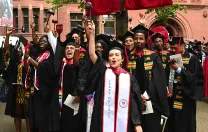As prepared for delivery.
Being here has, sometimes, felt unreal. I live in this beautiful community. I’ve got such wonderful friends. I’ve learned from kindhearted professors who have taught me so much more than just law. When I think about the nights out, the slices of Joe’s pizza at midnight, the kisses, the encounters with wild turkeys on my way to class and wild rabbits on my way home . . . I’m filled with gratitude because Harvard has, in many ways, been my refuge.
Not so much this year. This year, I’ve been reminded of how exposed we are. Antisemitism. Islamophobia. Anti-Arab bias. Death threats. Doxing. Losing jobs. Losing friends.
I had fallen into the trap of thinking that kind of stuff wasn’t supposed to happen here. I thought in our little bubble we’d be safe, that Harvard was a shield, and that the things we are—well educated, hardworking, successful, even beautiful—would protect us from the problems of the world. But I was wrong.
Now, our choice is to either be upset about our vulnerability, or to use that vulnerability to connect with others. And that choice will manifest in pivotal moments when people look to us for guidance. We will be decision-makers, and we’ll have discretion. Over and over, we will bear responsibility for making decisions that’ll change other people’s lives.
Think about some of the people whose lives we may help shape. Women dealing with the consequences of no longer having autonomy over their own reproductive systems. Immigrants fleeing places where there are no universities left from which to graduate. Climate refugees escaping homes that have become uninhabitable. And people whose only mistake was being born poor in a country that criminalizes poverty.
Throughout our lives and careers, we will encounter these people and others in circumstances they did not choose. The question is, will we use our experiences on campus this year to justify building walls around ourselves in a misguided attempt to keep the bad stuff out, to keep the bad people out, to separate ourselves from the rest of the world? Or will we seek out and build relationships with people who do not have our privilege?
You know what we must do. The diplomas we’re receiving today call us to action. They’re like notes from mom to take the chicken out of the freezer. If that sounds insignificant or unimportant, you must not have a mother like mine. Because let me tell you, as loving as she is, if I didn’t take that chicken out, we had a problem. Same for these diplomas. If we don’t use our Harvard educations and the power that comes with them to be in solidarity with others, it’ll be a problem. Not only will we disappoint our mothers, but we will also fail to fulfill our obligation to use what we’ve learned to make the world more just and more compassionate.
When I think about how I want us to utilize our educations after we graduate, a line from Steinbeck’s East of Eden comes to mind: “Now that you don’t have to be perfect, you can be good.” Except, we must be good. And that might be different than we’re used to. Striving to be perfect got us to Harvard and got us to this day. We’re here, in part, because we’ve learned how to work hard and figured out what it takes to be successful. But there’s a difference between working hard and doing good, and there’s a difference between being successful and being good.
Being good can mean a lot of things: Standing up to dictators. Being mentors. Using your Harvard network to help people who didn’t go here. Voting. Advocating for a ceasefire in Gaza.
If you disagree with some of those, that’s fine. There are lots of ways to be good. I’m a law student, but I’m not here to litigate that. I get that there’s complexity in what it means to make the world better.
But here’s something universal: being good means tapping into your own sense of vulnerability, all the ways in which you are not perfect, and using it to pay attention, to connect with others. It means seeing yourself in other people’s struggles, even if they’re different from yours. And it means that when you catch yourself judging someone for their circumstances or choices, and you’re tempted to use that judgment to absolve yourself of responsibility, you force yourself to think again.
The times we’re in call for us to no longer seek refuge in ivory towers and gated communities. Today, and each day for the rest of our lives, we must do more than simply be successful . . . work hard . . . try to be perfect. We must make the affirmative choice to be good. Because not being good would be a waste of the privilege of having graduated from this beautiful place, Harvard.
Godspeed, and congratulations.





